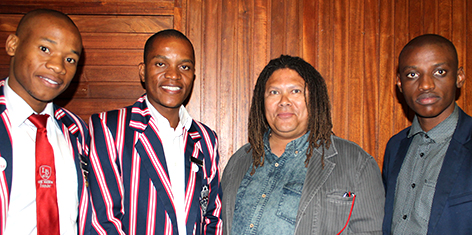
Lindokuhle Ntuli, Piet Tibane, Dr Willy Nel and Nkopane Mokoena. Absent - Dr M. Mwaniki
Photo: Hatsu Mphatsoe
Many were gathered at the engagement session that dealt with the use of parallel language in higher education and its implications for education access and social justice. The panel of speakers included Dr M Mwaniki (Senior Lecturer and researcher in the Department of Linguistics and Language Practice), Dr Willy Nel (Lecturer in the School of Education Studies), and Nkopane Mokoena (Chairperson of BLASC). The panel gave their views to audience members, views that were kept within the context of the language shift that the UFS is facing.
A large part of the session was centred on the idea that every language should be considered when talking about diversity. While it was expressed that an institution of higher education that fails to recognise all languages faces the danger of actually influencing segregation among students. The UFS recognises three of the eleven official languages in South Africa, and appropriately so. However, it seemed that much of the commentary was directed only at Afrikaans and English.
“Without systemic resources in a language, it will fade out,” expressed Dr Mwaniki. For as long as an institution continues to invest in preserving a language, it becomes harder for it to fall away.
Dr Nel stated that “UFS is still attractive to all language speakers,” which, at the same time, contrasts with the honest fact that “Incompleteness is a given.”
Mokoena argued that “We have a duty to communicate with each other.”
Many students and staff from the audience shared their views, and suggestions were made about developing indigenous languages, and that the issue of translation is not reason enough not to do so.